Psoriasis is a pink proof with silver scales. It is itchy and affects millions of people around the world. If a person or their relatives do not have such rashes, it does not mean that they are not visible. It is important to start treatment of the disease in the early stages of psoriasis and not in severe cases.
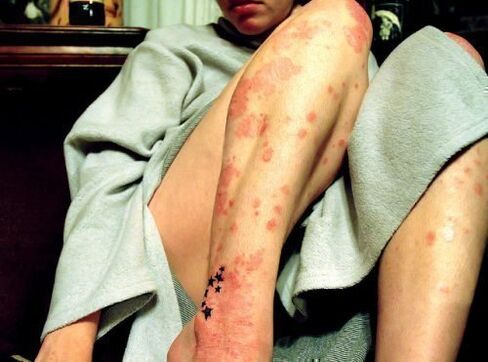
Psoriasis can be hereditary, but not in all cases.
Features of the disease
Psoriasis is not an infection and the reason for its appearance is a violation of the immune system. The disease can also be the result of external factors, skin injuries, stress, alcohol, antibiotics, infections.
Wounds can cover any part of the body. Rash is especially common on the arms and legs. They also occur on the palms, soles, scalp and nails.
Psoriasis is a chronic disease with a wavy course. In humans, rash may have periods of decline or may be exacerbated. Recurrences can be triggered by various external factors.
Psoriasis does not affect normal life and does not require permanent hospitalization. However, it is a serious pathology that brings many worries and limitations.
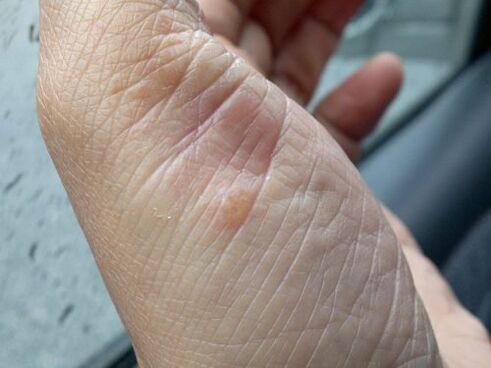
Manifestations of psoriasis can fade and become almost invisible.
Conditional division of psoriasis
There are several forms of psoriasis:
- obscene;
- seborrheic;
- in the form of drops;
- palm-plant;
- psoriasis in the genitals.
The most common form of psoriasis is a vulgar form of the disease. In addition, there are swollen rashes of a bright color, accompanied by severe itching.
There are three degrees of psoriasis, depending on the size of the affected area:
- Light. About 3 percent of the skin is affected.
- Medium. The number of rashes varies from 3 to 10 percent of the skin surface.
- It's heavy. Rash covers 10 percent or more of the skin's surface.
Sometimes the disease affects the joints. Although one hundred percent of the skin is affected by plaque, this is the most severe. May cause the development of psoriatic arthritis, accompanied by pain and swelling in the joints of the bones.
There are three stages of psoriasis according to the degree of severity:
- progressive;
- stationary;
- regressive.
Even a doctor will not always be able to recognize psoriasis at a certain stage. In many cases, special monitoring of the development of the disease is required. This will help determine if the psoriasis is in remission.
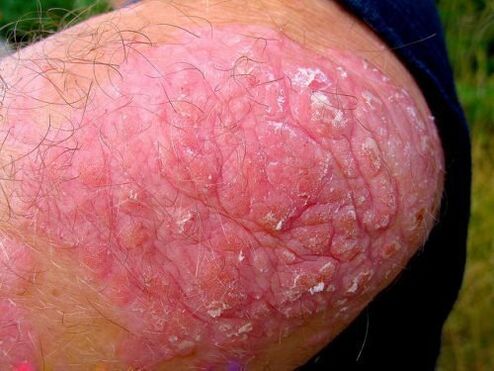
Psoriasis vulgaris has a bright pink color.
Progressive stage
In the early stages, psoriasis develops quite rapidly. Over time, various rashes appear on the arms, back, hips and legs, which grow and form plaques. The progression of the disease is characterized by severe itching of the affected areas, which can lead to hydration and infection.
Early psoriasis is treated. Therefore, it is important to make a correct diagnosis in time. At the first signs of psoriasis in the early stages, you should consult a doctor. Only he can determine the nature and stage of development of skin disease.
You can independently understand what psoriasis looks like with some symptoms:
- Spills appear where clothing is in close contact with the body. For example, elastic bands on the sleeves at the elbows, under the waistband.
- The itchy rash is covered with gray scales.
- If you take the scales, you can see a thin, moist skin underneath.
- The condition of the nails is disturbed, holes are visible on them.
Do not use any ointment without consulting your doctor. In the early stages of the disease, the use of some means can lead to the formation of stretch marks, thinning of the epidermis and addiction.
Your doctor will usually prescribe a non-hormonal zinc-based medication. It is an effective tool that eliminates itching, reduces the proliferation and inflammation of skin cells, restores the protective functions of the skin and reduces the development of psoriasis at a progressive stage.
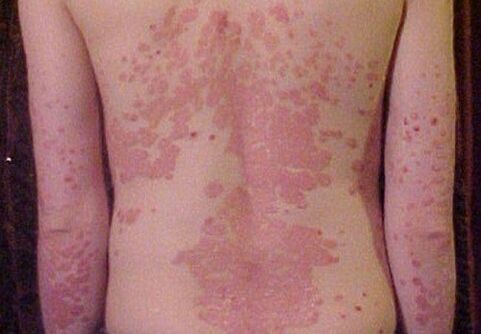
Psoriasis is most commonly seen on skin and clothing.
Stationary stage
The previous stage is replaced by the stationary stage of psoriasis. Inflamed nodules do not disappear, but do not grow. The plaques dry out and inflammation is reduced.
Resin preparations are widely used to treat the inpatient phase of psoriasis. Sometimes systemic therapy is used and the body is exposed to ultraviolet radiation.
Regressive stage
This is the final stage of psoriasis, in which the plaques begin to shrink and slowly disappear. Resorption occurs in the middle of the wound, and at the end of this stage, small rings and patterns remain on the skin. Eliminates itching & peelingAfter a rash, hardly noticeable pigmented areas remain on the skin.
This process is the end of the psoriasis cycle, but not a complete recovery. The disease can recur at any time. If left untreated, plaques will appear regularly.
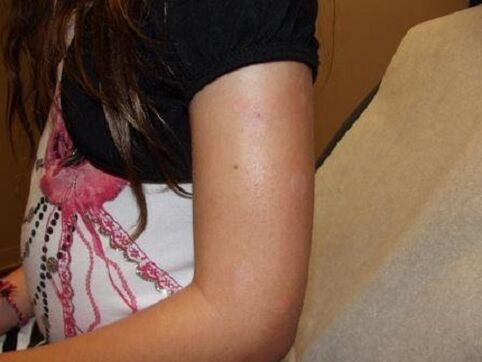
After psoriasis, blemishes and patterns may remain on the skin.
Treatment and prevention of psoriasis
Everyone should monitor their health and pay more attention to the skin:
- Avoid tight clothing that can scratch your skin.
- It is preferable to use special medicated shampoos. This is especially true of psoriasis of the skin.
- In order not to over-dry the skin, it is necessary to pay attention to the optimal hydration of the indoor air.
- Avoid abrasions, injuries and cuts on the skin.
- A certain diet should be followed to improve the course of the disease.
- One of the main rules of prevention is the rejection of alcohol. You should not drink alcohol or smoke.
- Wear loose clothing that will not cause friction.
A special massage is used to prevent and treat psoriasis. Improves blood circulation to cleanse skin fasterThe areas around the boards of the body extend up to a few centimeters and are returned. The procedure takes about 15 minutes.
Symptoms of the disease occur against the background of psycho-emotional stress. Therefore, it is important to minimize stress. It is recommended to use various relaxation methods, get enough sleep and rest more, use herbal medicines and sedatives.
Some patients use folk remedies at home. To do this, use various herbal infusions and decoctions, egg and lard ointments, garlic compresses and lotions before going to bed. Alternative methods should be used after consultation with a specialist.
Some medications can cause relapses and side effects. They should only be taken on the instructions of your healthcare professional. Unfortunately, there is no cure for psoriasis 100 percent forever. You can only keep the disease in remission by choosing the right medication.























